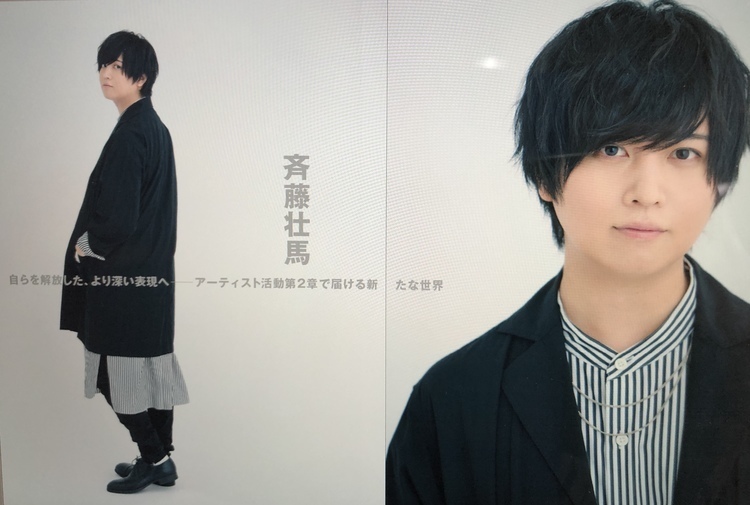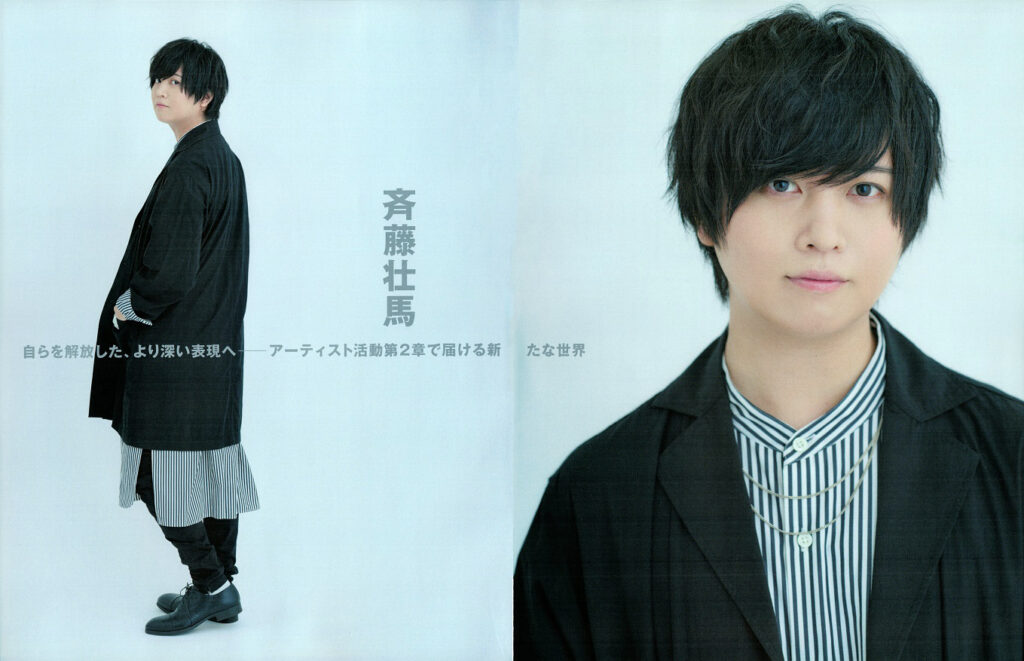
Released: 2020/9/18
“My songs merely depict a certain ‘state.’ I like expressing feelings, scenes—things that don’t have names—in other forms.”
—What was the concept of the new music you wanted to produce in “Chapter 2”?
Since I consider voice acting the central axis of my work, my music up until now has been pop style, focusing on entertainment value. There were quite a lot of choices I passed over because they wouldn’t suit the image of “the voice actor Saito Soma’s” music. But after releasing an album, performing live, and reading the listeners’ feedback, I grew confident that people would still listen to my music even if I went a more hardcore route based on what I wanted. If people were willing to accept that, then I could release songs from the “unchosen” genres and lyric themes. That feeling is what led to the designation of a new chapter, Chapter 2. My songs up until now have had a consistent apocalyptic, decadent motif, and I think it’d be nice to sing about what people’s lives are like after the end of the world. Many of my previous songs had majestic arrangements, but I think there’ll be more songs that are on the introspective side from now on.
—In the past, you wrote music and lyrics in an elaborate manner, right?
Yes. I intentionally packed multiple song ideas into a single track, because it seemed like it’d be a better deal for the listener that way *laughs*. Writing songs like that was fun in its own way, but if it’s like that every time, it gets tiring for the listener, right? It’s like how eating a full course for every meal doesn’t necessarily taste good. So for these three songs, instead of that extravagant, jam-packed approach, I stuck with one idea for each song. For example, “Petrichor” builds up a groove with the repetition of that striking saxophone riff. I narrowed down my ideas a bit and tried to make it into something you won’t get tired of even if you listen to it on repeat. I think it became a simple (in a good way), relaxed song.
—The vocabulary in the lyrics also felt much more everyday than your previous songs.
I liked writing lyrics with symbolic phrases and words, but saying complicated things in a complicated way is actually a rather simple task. So this time, I chose not to rely on the words’ own impressions—which actually increased the abstractness of the lyrics. Something I really focused on with “Petrichor” was writing lyrics in the “new music” style (pop genre that trended in the 70s and 80s in Japan). You can understand them to an extent from looking at the written words, but the atmosphere changes completely depending on what angle you look at them from. I think they’re considerably more technical than the lyrics I wrote in the past. Since I’m still not singing about my own messages or assertions, I want the listeners to be able to enjoy my music in various different ways. They can still have fun speculating about the meaning…but I hope they’ll sense that the flavouring has changed a bit.
—Even though you aren’t using obscure vocabulary, your fixation with words hasn’t changed.
Right. Since the theme is “the changing of seasons,” I’m singing about something ambiguous and uncertain, so I’m trying not to use firm words. I also used to use a lot of katakana words, but this time I toned them down. In the case of “Petrichor,” I specifically chose words that felt round like raindrops.
—The upbeatness of “Summerholic!” felt very new. Did this song also come about because of the “seasons” theme?
This song was created to coincide with the release timing. The MV is rather cheery too, in a way that seems like something’s wrong with my head *laughs*. During the spring I was spending more time at home, so I decided to make a ton of demos. As I was playing my guitar, I came up with the first riff in “Summerholic!” and thought, “This is a really happy riff. Oh, this must be a summer song.” The same thing happened with “Palette”—I thought the first riff was autumn-like. It was like, once the theme was set, the missing pieces were filled in. I think the lyrics also came along cleanly because of the central “season” theme.
—Did you suggest your own ideas for the arrangements too?
I definitely don’t do any actual arrangement, but for example, for “Petrichor” I said, “Please use this riff, and add noise guitar at the halfway mark.” But I can’t play the detailed phrases by myself *laughs* so I leave those to the musicians. It’s fun to have things added to my songs that are outside of the scope of my imagination.
—When you’re composing a song, where do you start? The melody, lyrics, the underlying setting, or something else?
I think the melody comes ahead of the lyrics more often, but ideally I’d be able to do both at the same time. They’d match up better that way, and I think it’d result in broader appeal to listeners. When you take the time to put thought into writing lyrics, it takes a bit longer for them to reach the listeners’ subconscious. In my songs, when the melody is going up on the scale, I’ll intentionally create a discrepancy by putting words that go “down” in how they sound, which is a sort of technique. But in reality, I think it’s nice to be able to come up with both melody and lyrics at the same time.
For this series, it’s as I said earlier—the riffs came first. “Palette” came about when I was stuck on “Petrichor.” I had a general idea of what “Petrichor” was going to look like, so I decided to take a break and play some really loud, distorted sounds on my guitar. As I blasted my guitar through my headphones, I came up with the first phrase in a “I like this kind of thing!” way. I recorded a prototype up to the first chorus, using some random language that wasn’t even English. I think a lot of the nuances from that random language remain in the lyrics now.
—Are you insistent on changing the lyrics to Japanese while keeping the nuance?
Yes, when I first began writing songs, I’d use arbitrary English for the lyrics, but that always made the melody turn into something Western-style, so I started resolving myself to Japanese. Lately I’ve been thinking that English might be fine too, but I feel like I’ve gone back to Japanese anyway *laughs*. Since “Summerholic!” has a Western feel to it, the prototype had an English line that went ♪I have to say you good-bye~♪ which fit really well. I struggled a lot because there wasn’t any Japanese that could surpass it. It would’ve been fine to leave it in English, but when I’m writing lyrics, I don’t really like to combine Japanese and English. I want to challenge Japanese pop music…out of respect for Kusano Masamune-san. *laughs*
—I see! That makes sense.
I also care a lot about the appearance of the kanji themselves. In the case of “rain” (雨), I like how “ame” sounds, and I like the kanji itself too. So looking at the lyrics card is fun, and reading the lyrics is fun—I hope it became a song that’s enjoyable in a variety of ways. This series is being released digitally, but I do want my next release to be on a physical CD.
—I hear that you don’t just do the composition and lyrics; you also think about the work as a whole. Do you feel like you’re acting the part of the protagonist?
Yes, I do. Rather than creating songs as a representation of myself, it’s more like writing a novel or a film. But that doesn’t mean my songs are purely stories either. They merely depict a certain “state”—in the case of “Petrichor,” I turned “the state of a person in the rain, walking with a strangely happy swing in his step” into a song. So when I think of a theme, it feels like, “Even though it’s really sunny, I want to write about a rainy afternoon garden.” In the case of “Palette,” I wanted to write a song using the element of “walking along a path with lots of fallen leaves and suddenly feeling lonely”… But like I say every time, the lyrics I write aren’t about myself, so it’s not that I’m lonely or anything. I generally don’t refer to what the character is thinking, instead portraying them from an objective view, like a camera. Things like happiness and sadness are for the listener to feel. It might be that I like expressing feelings, scenes—things that don’t have names—in other forms. So even when I listen to “Petrichor,” sometimes I think it’s really fun, but sometimes I think it’s scary. That’s how I’m distanced from the song. There are also times when I read everyone’s interpretations and think, “Oh! That could be true.”
“The way I write songs changed after I became a voice actor. I think these two jobs interact well with each other.”
—It’s been about two years since you began being a composer and lyricist with “Date.” Has your approach changed?
It’s not so much that it’s changed in these last two years, but more that the way I write songs changed after I became a voice actor. I don’t think I would’ve been able to write the lyrics for “Date” if it weren’t for the experience I received through character song work. The way I compose songs is also heavily influenced by my voice acting work, and I think these two jobs interact well with each other.
—You said that with Chapter 2, you want to release the genres and settings that weren’t chosen before. What do you think your future direction will look like, specifically?
The songs that I wrote as a hobby when I was a teenager were mostly dark. I often wrote songs that faced inward, rather than outward. Some of my released songs like “C” and “Rutsubo” also have a dark, dangerous flavour, but those are still quite mild in comparison. From here on, I want to go in deeper and make something darker and more introspective. My musical roots lie with the Japanese bands around the 2000s, with their introspective and literary lyrics—like ART-SCHOOL and GRAPEVINE. Those songs really saved me, and I resonated with them. I want to keep those roots while making music that’s more incomprehensible, like using an irregular metre, or never repeating any phrases and getting to an F-melody *laughs*. I want to expand my definition of “pop music.”
—So you want to reopen the metaphorical drawer of music that you wrote before becoming a voice actor.
Indeed. I want to try making something based on my roots, or rather, based on what I like, and if everyone thinks “This doesn’t feel right,” then so be it *laughs*. I’m still going to be optimistic about trying it once. I think the advantage of being a voice actor artist is that you don’t have to restrict yourself to a single style of music. Regardless of whether my next song is Showa-era pop or EDM, it’ll still be accepted as Saito Soma’s creation. I want to make use of that advantage. Of course, it’s not out of complacency, but rather that I want to see how far I can go.
—I’m looking forward to seeing what kind of music you’ll create now that you’ve unleashed yourself.
Hahaha. Something I’m working on right now is fairly post-punk, and the new lyrics I’m writing for it are pretty crazy *laughs*. I hope I’ll be able to release something with a bit of a “not right in the head” feeling that I haven’t done before.

